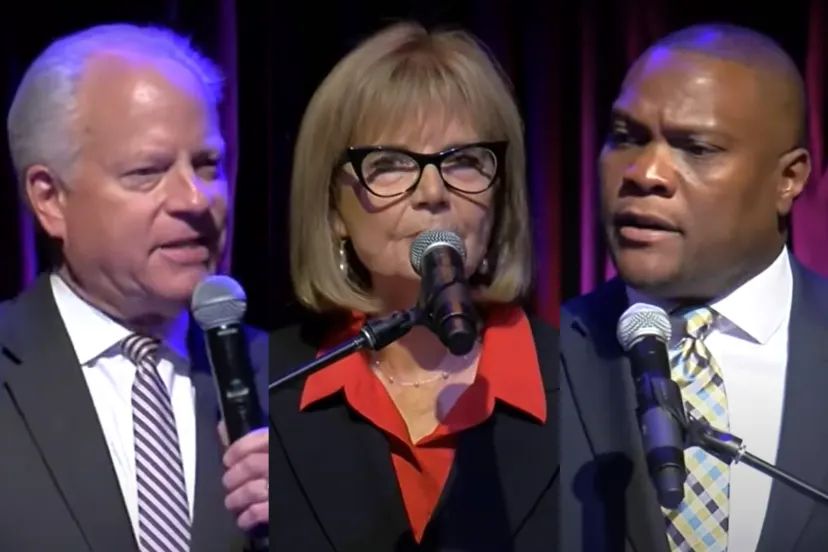(TULSA, Okla.) The Tulsa Mayoral Election is next Tuesday, and seven candidates are vying for the opportunity to run the largest U.S. city that sits on three tribal reservations: Muscogee Nation, Cherokee, and Osage.
This year, VNN Oklahoma is committed to covering elections with a focus on Indigenous perspective.
Related Story: Tulsa Mayoral Candidates Discuss Governing a City Sitting on Reservation Land
On August 8, NonDoc Media and KJRH held a debate at Cain’s Ballroom for the three candidates who had at least 10 percent of support in the polls or verified campaign fundraising of at least $50,000.
These requirements meant only State Representative Monroe Nichols, Tulsa County Commissioner Karen Keith, and Businessman Brent VanNorman were able to participate.
The debate focused on issues ranging from housing and business development to education. A small portion of the debate was dedicated to a question about tribal policy, specifically related to law enforcement.
When it came to that topic, the three candidates were each asked to respond to the question: “If you become mayor, will your administration continue to pursue criminal jurisdiction over tribal citizens in Tulsa?”
The answers of each candidate varied with VanNorman responding first with a ‘yes, absolutely.”
“To not do that is to invite chaos into the city,” VanNorman said. “You can’t have people just because they have a different license plate to be able to drive into the city and break the law. If someone’s here from Kansas speeding we expect our police to pull them over and give them a ticket and so we have to do that same thing. There are ways that we are now cross deputizing between the tribes and the city and we need to continue that.”
For context, the Supreme Court has ruled only the tribes and the federal government have jurisdiction to prosecute Native Americans for crimes committed on reservation land.
Muscogee Nation filed a lawsuit against the City of Tulsa last November for violating that jurisdiction, saying the city prosecutes Native American traffic offenses itself, despite lacking jurisdiction to do so and referring other criminal matters involving Native defendants to the Nation.
The Supreme Court later ruled Oklahoma does have concurrent jurisdiction to prosecute non-Native Americans who commit crimes on reservation land.
VanNorman said city officials will need to sit down with tribal leadership to create a system of working together.
When asked about pursuing criminal jurisdiction over tribal citizens in Tulsa, Keith said she thinks they have the authority to do that, but she wants to sit down with the Nations to talk about the best path forward.
“I believe that we can come to a consensus and maybe get rid of the legal issues,” Keith said. “I think my relationships with the Nations will be helpful. We need to get on the same page. I can promise you they don’t like having all this disparate laws in place. They want us to all work well together, so that’s sitting down and talking with them. We have amazing leadership in our Nations and I respect that leadership and I want to work with them.”
Keith also said she previously spoke with Cherokee Nation Principal Chief Chuck Hoskins Jr., about the possibility of a tribal court component if a new Tulsa County Courthouse is built.
Nichols said he would not prosecute tribal citizens.
“The direct answer to the question is no,” said Nichols. “Tulsa is the largest city in the country that’s all Indian reservations. And what I know from my years in the legislature and the attacks against tribes over the years, what I know is Tribal sovereignty can’t be something you’re for, when it’s convenient, it has to be something that you stand on all the time and it’s been set in law already. And so that is the reason why the very first thing I talked about in this campaign, co-governing, with our tribal nations and that starts with the appointment of the first ever director of Tribal Policy and Partnerships that will have a role in the mayor’s office.”
The full debate can be viewed online here.
Casey Bradford, Kaleb Hoosier, John Jolley, and Paul Tay will also be on the August 27th ballot.
Tulsa City Councilor Jayme Fowler dropped out of the race back in May.
If one candidate does not receive more than 50% of the vote on August 27th, there will be a runoff in the November General Election.
In addition to following the results of this election, VNN Oklahoma is also working on Indigenous perspective pieces for the upcoming US presidential election.
VNN’s Native District counters misinformation and disinformation by providing accurate and reflective Native American coverage as well as resources and events. Our work also helps to preserve Native American culture for future generations. But we can’t do it alone. Click here to support our Native District today.

